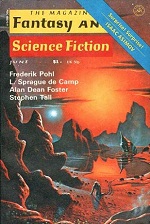Balsamo’s Mirror
- by L. Sprague de Camp
- Short Story
- Fantasy
- Adults
- Definite Time Travel
- English
- “Balsamo’s Mirror” by L. Sprague de Camp, Magazine of Fantasy and Science Fiction, June 1976.
MIT student W. Wilson Newbury has a creepy Lovecraftian friend who is enamored with the 18th century, so naturally they visit an Armenian gypsy who makes them passengers in the bodies of an 18th century pauper and his father.
This story gave me a game that I play of pretending that I have just arrived as a passenger in my own body with no control over my actions or observations. How long does it take to figure out who and where I am? So, I enjoyed that aspect of the story, but I have trouble reading phonetically spelled dialects.
In his autobiography, de Camp says he based the setting of the story on his time as a graduate student at MIT in 1932, when Lovecraft (whom de Camp didn’t know) lived in nearby Providence: “I put H.P. Lovecraft himself, unnamed, into the story and stressed the contrast between his idealized eighteenth-century England and what he would have found if he had actually been translated back there. To get the dialect right, I read Fielding’s Tom Jones.”
This story gave me a game that I play of pretending that I have just arrived as a passenger in my own body with no control over my actions or observations. How long does it take to figure out who and where I am? So, I enjoyed that aspect of the story, but I have trouble reading phonetically spelled dialects.
In his autobiography, de Camp says he based the setting of the story on his time as a graduate student at MIT in 1932, when Lovecraft (whom de Camp didn’t know) lived in nearby Providence: “I put H.P. Lovecraft himself, unnamed, into the story and stressed the contrast between his idealized eighteenth-century England and what he would have found if he had actually been translated back there. To get the dialect right, I read Fielding’s Tom Jones.”
I didn’t say that we could or should go back to pre-industrial technology. The changes since then were inevitable and irreversible. I only said. . .

Tags
(1)
- Groupings
Variants
(1)
- “Balsamo’s Mirror” by L. Sprague de Camp, Magazine of Fantasy and Science Fiction, June 1976.
